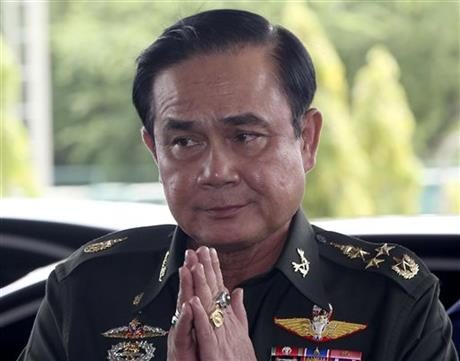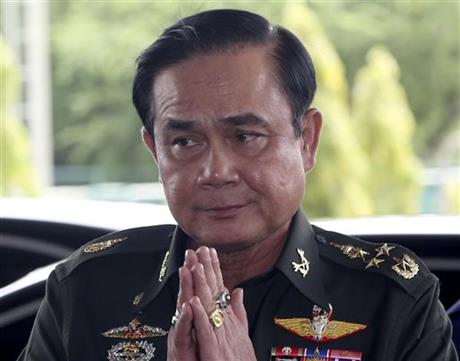Days after being sworn in, Prime Minister Prayuth Chan-ocha’s cabinet is already facing its first corruption scandal and seems to be failing the test. Although the National Council for Peace and Order (NCPO) has engaged in wasteful spending that resembles Thaksin’s notorious populist policies, this is the first time that the public has been confronted with hard evidence of suspected corruption.
Last week Panadda Diskul, the Prime Minister Office’s Minister and the Permanent-Secretary of the same office, showed the press a new set of 89 microphones for the cabinet’s meeting room. Fitted with state-of-the-art anti-intelligence technology, each unit cost 145,000 baht. “Now the Thai cabinet is using the same technology as the White House,” boasted Panadda. These microphones are only the first lot of the 192 units to be delivered shortly after. They are part of a larger 255-million-baht scheme for the renovation of Government House approved by the NCPO. Because the renovation is being carried out in haste, it was waived from the normal procurement process. The supplier was chosen without bidding. Suspicion arose when the public investigated and found that the same microphone was displayed on the supplier’s website for only 99,000 baht. The government would have been paying a premium of 7.7 million baht.
Anyone familiar with public procurement will agree that an agency may obtain a worse deal than a private purchaser would. Thus, although this time the price is slightly too high, that can be justified. However, how the involved parties responded only raised more suspicions. Soon after the exposure, the supplier changed the price on its website to 199,000 baht while the NCPO kept mum on this issue. Panadda Diskul, who is in charge of overseeing Government House, claimed that he knew nothing about the installation of electronic devices and that it had been decided by the Department of Public Works and Town Planning. The Director-General of the Department then explained that the procurement has not been finalized yet – the supplier had delivered microphones before price negotiations. Later this week, the Department and the supplier negotiated the price down to 95,000 baht each. But further investigation revealed more purchases of outdated technology at inflated prices.
The microphone scandal confirms that the NCPO has no wisp of sincerity to curb corruption and restore transparency. Its anti-corruption campaign is propaganda, or worse, a tool to suppress political opponents of the elite establishment. If the junta truly wishes to fight corruption, Prayuth has to learn three lessons. First, transparency must begin at home. If his condemnation of former Prime Minister Yingluck Shinawatra is more than mere hypocrisy, Prayuth must also act against the corruption within his own regime. He must discipline his men. The government must not bypass any procedural safeguards. Second, only a timely and honest investigation will satisfy the public’s doubt. Panadda must stop urging the public to rely on his and General Prayuth’s personal integrity. Panadda’s great grandfather was the highly revered minister of the Siamese court and the brother of King Rama V. But his esteemed lineage and Prayuth’s reputation as an honored Army Commander are no guarantees of accountability. Thaksin once used this tactic and failed. Third, Thais are not that stupid. Lame explanations lead to more distrust. Modern technology and the spread of information make attempted cover-ups futile. These old tactics employed by civilian politicians can only damage the junta’s legitimacy.
This is the first scandal of Prayuth’s regime, but surely it will not be the last. The perfect combination of absolute power and an inactive anti-corruption agency ensures more abuse of power. The NCPO, which has become the cabinet, is relieved of liability by the Interim Charter, and the National Anti-Corruption Commission is notorious for its inefficacy and bias. Despite the public uproar, the Commission announced that no irregularities were found: case dismissed. Assessment of public opinion is difficult because of ongoing suppression. But this should be enough to wake coup supporters up to the cruel reality that only democracy can fight corruption. They should stop justifying military corruption as a smaller and more acceptable corruption, a reward for overthrowing the Shinawatra family. For 80 years, military corruption has never ended civilian corruption. Democracy is not perfect but at least it offers freedom of expression and checks-and-balances, both of which are necessary for the struggle to build a more transparent Thailand.
When a civilian government failed the transparency test, many Thais rallied and invited the military in. For the coup to materialize, they sacrificed economic growth, rights and liberties, the rule of law, and human lives. But when the supposed savior scores badly on the same test, what punishment should be imposed on the junta and its supporters?
Khemthong Tonsakulrungruang is a constitutional law scholar in Thailand
 Facebook
Facebook  Twitter
Twitter  Soundcloud
Soundcloud  Youtube
Youtube  Rss
Rss 
